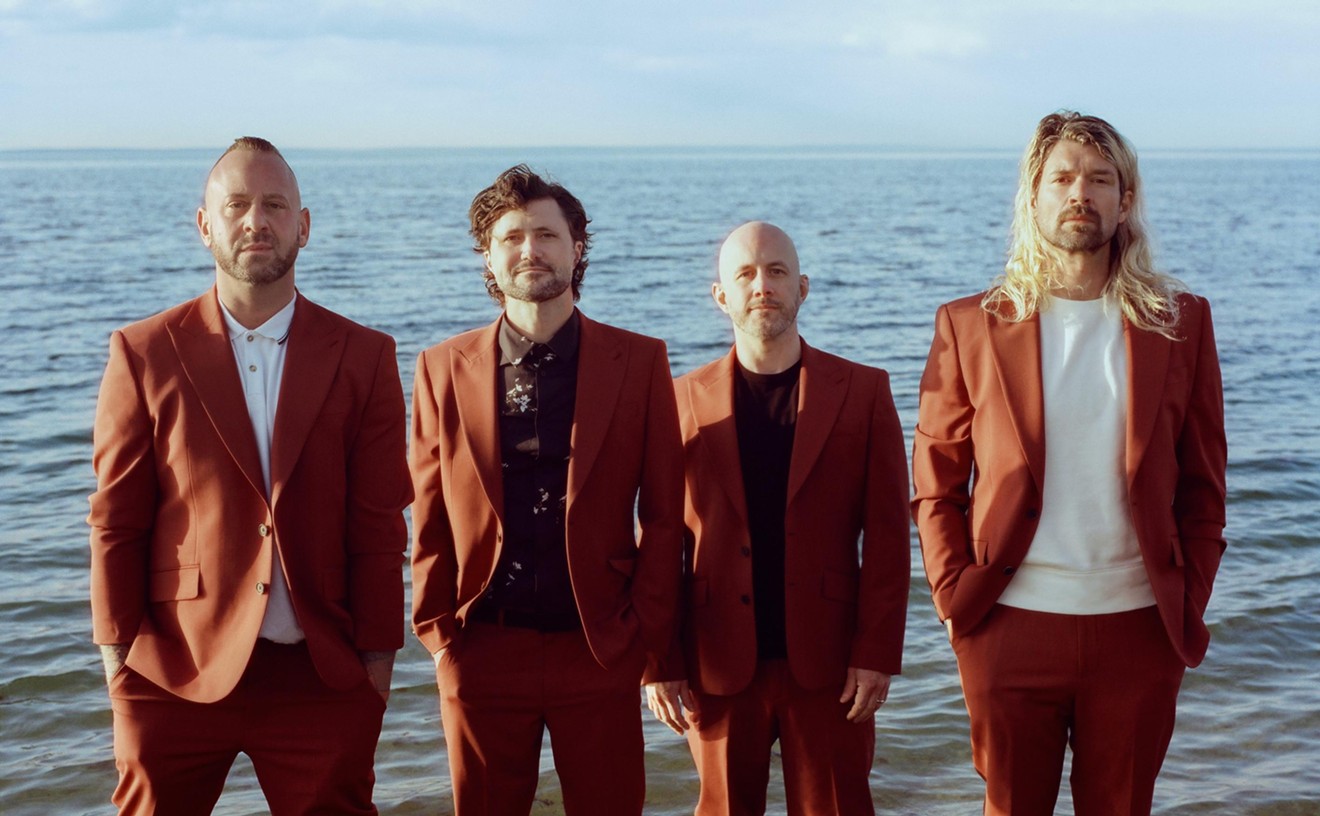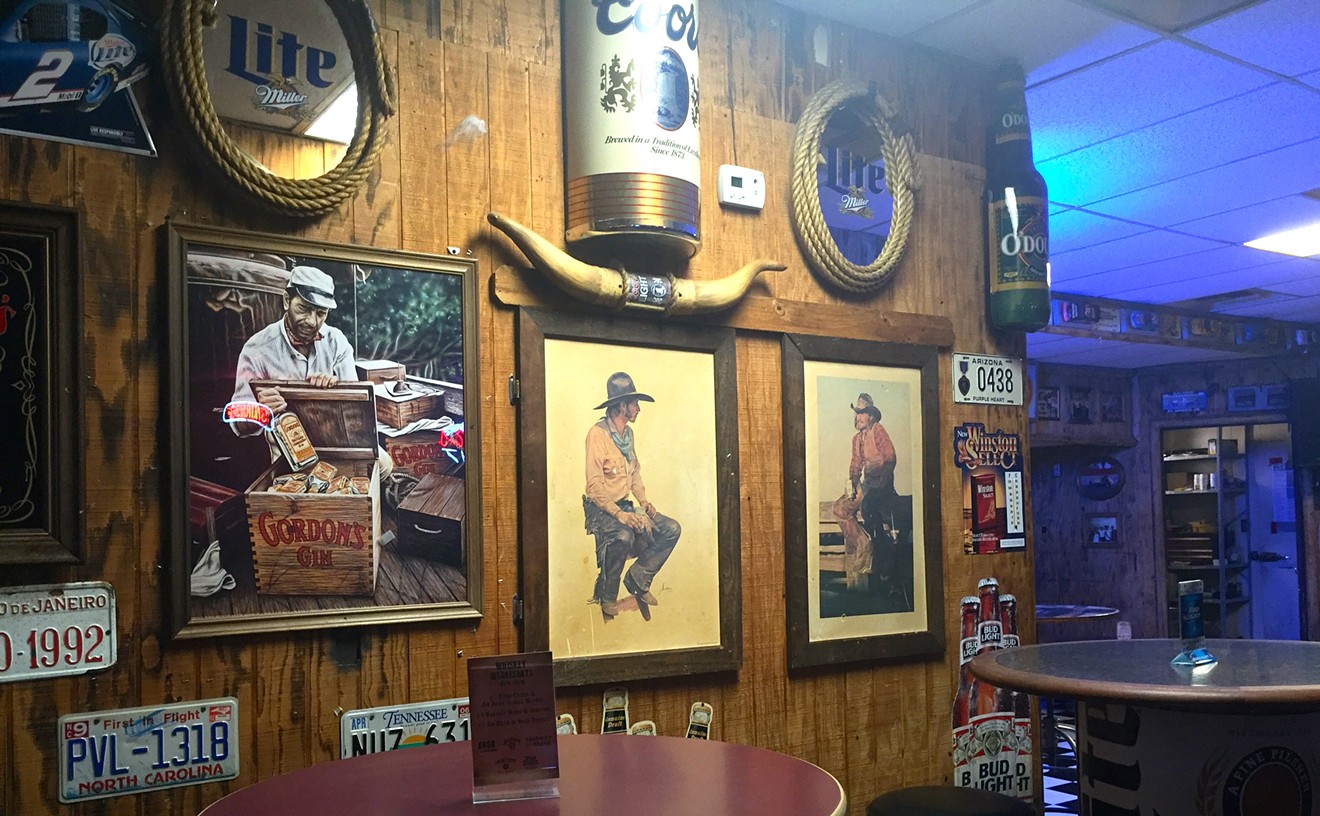L.A.'s Concrete Blonde formed in 1987 and enjoyed an early '90s chart run that culminated in the Top 20 hit "Joey," a heart-stopping pop gem similar in tone to the Police's "Every Breath You Take" and whose memorable story line (about a romance shattered by alcoholism) gained considerable visual momentum when the video hit rotation pay dirt on MTV. The band was kaput by '94, however. So confronted with a Concrete Blonde reunion album and tour, consumers might warily ponder the above scenarios.
Check "None of the Above," or perhaps "Don't Know," for the band. Because the members themselves -- vocalist/bassist Johnette Napolitano, guitarist Jim Mankey, drummer Harry Rushakoff -- aren't quite sure why they drifted back together in the middle of last year.
"Well . . ." Mankey draws the word out slowly, as if he's about to drop a bombshell, then with a chuckle, doesn't. "We had done a few things in the meantime, so it wasn't that nothing had been happening. (Since '94 Mankey and Napolitano, in addition to their own projects, continued to touch base and worked together on other artists' albums.) Johnette just called, and then we just had fun jamming, really. That's something we never really did before, jamming.
"Our chops were a little rusty because it had been awhile since we'd played the old songs, so the first hour and a half was kind of odd. But it didn't take long for us to feel like we'd been playing together for awhile -- it was kind of shocking, really! We realized we just want to try to keep creating and remain relevant to ourselves."
So why the initial breakup? Any Behind the Music-worthy scenarios?
"To be honest, we'd done it for a while and I guess we were just getting on each other's nerves, is what [the breakup] came down to. Johnette wanted to do her solo thing, which she did. Plus, we were all just goddamned tired! None of that Fleetwood Mac stuff! But you know, VH1 did approach us. I just do not want to get behind that thing. Harry is the only one here that has the proper stories to tell, tales of debauchery and excess. I lead a very boring life, not much there to interest the demographic target of VH1, I'm afraid."
Mankey and Napolitano hooked up at the tail end of the '70s while both were working at Leon Russell's Paradise Studios in North Hollywood; Mankey, a former member of the comedic rock band Sparks, was an engineer, while Napolitano was the receptionist. Forming the band Dream 6 around 1982, they became fixtures on the L.A. postpunk scene that included Dream Syndicate and Wall of Voodoo. Later, at the suggestion of a friend (Michael Stipe) and with drummer Rushakoff coming into the fold, they rechristened themselves Concrete Blonde and signed with I.R.S., releasing their debut album Concrete Blonde in '87. The trio's first taste of commercial success followed two years later with "God Is a Bullet," from sophomore effort Free; "Joey" and its parent album, Bloodletting, arrived in 1990. (Around this time Roxy Music drummer Paul Thompson replaced Rushakoff for a period. Per Mankey's comment above, Rushakoff has weathered recurring chemical problems over the years; prior to the recent reunion he completed an extensive rehab program.)
Recalls Mankey, "I remember the first time when we were rolling down the road and some radio station was playing us. We all got excited, of course. But then you say to yourself, 'Well, it's working. Let's keep doing what we're doing' and take more of an overview. But I will say, my most exciting time was when we were in Australia standing on a street corner about to cross the street, and a car drove by and I heard 'Joey' blasting. Now that excited me! [laughing] Halfway around the world, in a passing car: That's when you know you've made it.
"We'd be onstage playing ['Joey'] and you could definitely feel the audience, the difference, when that song started happening, a different energy in the audience. It quit being the intense, dark club denizens and turned into something quite frighteningly 'regular people on beer.' Nothing against that, but it was just a shock because it brought in a whole different crowd we weren't used to seeing. Just this swirling thing would start coming up from the crowd. Really strange."
For 1992's Walking in London and 1993's Mexican Moon, Concrete Blonde moved to Capitol, and while neither yielded hits on the order of "Joey," they both maintained a consistently high degree of musicality. The band continued to tour heavily up until the breakup -- Rushakoff rejoined the lineup as well -- and its international fan base also continued to grow.
That still-active fan base, in fact, judging by the numerous Concrete Blonde Web sites, should ensure the newly reincarnated trio a strong response to Group Therapy, issued this week by Manifesto Records.
The album was self-produced by the band, and, as a result of their extensive rehearsal sessions, it came together in the studio in a whirlwind 10 days. (Mankey: "Previously Johnette, as principal songwriter, would have the song either fully written or close to it. This time we would all jam, tape it, pick out the things we like, then beat them into a song. It made everyone feel a lot more involved.") Yet Group Therapy is, sonically speaking, remarkably consistent with its predecessors. From the vibrant surf/Latin/Hendrix vibe of "True, Part III" and the gently anthemic pop stylings of first single "Roxy" (an FM natural along the order of "Joey," and, yes, it's a tribute to Roxy Music) to the edgy, chiming noir-metal of "Violent" and the surreal, ominous psych-blues of "Angel," the album sounds like the band never went away. Key, of course, are Napolitano's signature vocals, dramatic (but not theatrical) and sensual (but not cartoonishly sex-kitten), and her narrative lyric style which encompasses caustic self-examination, reflections upon doomed relationships, surreal streams of consciousness and some decidedly pointed recasting of dreams.
"Violent," in particular, is gripping, with lines like "I feel burned out like I've expired/Freaky dreams and you are there/With glowing eyes and burning hair . . . [A world] always shoving and raping and cursing each other/Exploding into violence." Considering that the album was written and recorded prior to September 11, and knowing that Napolitano does card readings as a certifiable psychic, does Mankey now feel the song was a premonition of sorts? Napolitano herself has said in recent interviews that prior to the band getting back together she'd been having X-Files-type dreams involving bombs falling out of the sky, hitting women and children.
"A foreshadowing, yes, you could say that," agrees Mankey. "She is psychic. I'm a skeptical kind of guy, but I can't argue with some of the results -- she is tuned into something. She'll have a personal experience or a dream and put it right down in a song. We played a WTC benefit [September 30 in L.A. for the New York Firefighters 9-11 Disaster Relief Fund] and at first we weren't going to do 'Violent' because Johnette thought it cut a little too close to home."
On the eve of heading out on the road for the first Concrete Blonde tour in eight years, Mankey is upbeat, saying, "We're backing off a bit on the frenetic pace of touring so we don't start to hate each other. We'll publicize and promote because that's what you have to do, but I don't think any one of us are gonna go insane over it. We're mostly on the edge enough as it is, so we don't need that extra to -- [laughing, in loud voice] PUSHUSOVERTHEBRINK!"
And while equally enthusiastic about the new album, Mankey claims no psychic abilities for himself regarding whether the band will strike "Joey"-style gold this time around.
"People have pretty short memories. Personally, I think our new stuff is good enough to be on the radio, but only time will tell. The way the machine works is pathetic. If you can't place big bribes, well, that's what it basically amounts to. We're not in a position to spend that sort of money, so I don't really see us in there. As far as trying to make a living, we're [trying to be smart] because the major record companies are headed for some traumatic change. Every 10 years or so they collapse under their own flab, then manage to co-opt whatever replaced them and rise to the top again. So our deal with Manifesto is really unusual.
"They are doing a lot of work to promote us, but it's not like the usual company where they give you this advance, you do all this work, and you never see any money later. EMI and Miles Copeland [I.R.S. Records] own our previous masters; with Group Therapy we pretty much own everything and are leasing/licensing the music.
"You know, Courtney Love gets a bad rap when people talk about her -- and she's easy to criticize! -- but I really admire her for putting herself on the front line of [record companies vs. artists' rights]. She's probably the only person who can do that, go up against them, and really not care if she never has lunch in this town again. Record companies will collect your money, then won't give it to you unless you sue for it. So I think we've learned a lot."










